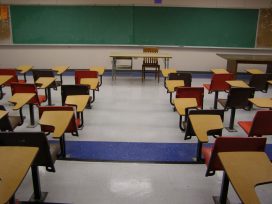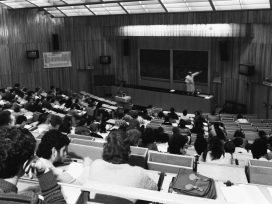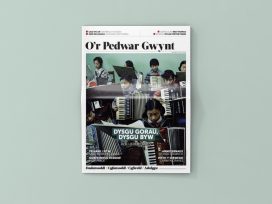For several issues now the editors of Dialogi have been examining a problem of great current interest: the relationship between national scientific languages and the global language of English. This question has recently sparked polemics in Slovenia.
The challenge has been set by the Bologna reform, with its principles of “greater compatibility and comparability of higher education systems” and goal of “encouraging mobility and European cooperation”, which demands a greater flow of scientific information, professors and students. As a result, a number of European languages have found themselves facing a dilemma: how can the national language be preserved as a language of scientific communication and academic instruction at the university?
In the 1-2/2007 issue of Dialogi, we addressed some questions on this topic to the deans of some faculties in Slovenia and to the Slovenian Ministry of Higher Education, Science and Technology, and discovered that Slovenian universities and politicians have not yet arrived at a unified strategy in this area. Since this is a structural problem of the European Union, in the 5-6/2007 issue of Dialogi, we also put our questions to Dr. Janez Potocnik, the European Commissioner for Science and Research. Among other things, he emphasized that decisions regarding programs of study and their linguistic variants are up to the individual EU member countries. Thus at the conclusion of this series of social diagnoses, we addressed our questions to the deans of selected faculties and departments in different European countries in order to find out what they think about the issue and which languages are used in academic exchanges at their institutions.
Unfortunately, despite all our efforts and several deadline extensions to allow more time for them to respond, we received only two responses. Given the total silence of those who failed to respond, we can only speculate as to the reasons for this lack of response. Perhaps they did not deem it worth their while answering the questions of a Slovenian cultural magazine; perhaps they had not even given any thought to the question; or perhaps they did not understand our questions in English, which we resorted to as a tool of communication (while stressing that they could respond in their native languages).
Questions from the editors of Dialogi to deans:
1. Has your faculty hosted foreign professors and students in the past academic year, and if so, how many, for how long, and in the framework of which exchanges?
2. In accordance with Article 149 of the Treaty on the European Union, the determination of the instructional content and organization of educational systems and their language variants lies in the jurisdiction of member countries. Has your country arrived at a systematic solution to the problem of the language of instruction in the case of student and professor exchanges? In which language are lectures at your faculty given when foreign students or professors take part? Are there also subjects at your faculty in which your students listen to lectures exclusively in English or another foreign language (excluding of course foreign language classes)?
3. What is your personal view of the use of national languages in modern science and academia? Some intellectuals are of the opinion that we are entering an era comparable to the Middle Ages and early modern period, when Latin was the universal language of learning, except that today that role will be played by global English. Do you agree with this vision, or do you think that the development of national languages for academic use should follow a different course?
4. Is there also a schism in your country between the natural sciences on the one hand, which are more inclined towards the use of English only, and the humanities and social sciences on the other, which continue to favor the use of national languages?
We received responses from Prof. Andrea Segrè, dean of the Faculty of Agriculture at the University of Bologna (7 June 2007) and Prof. Ulla-Maija Kulonen, dean of the Faculty of Arts at the University of Helsinki (19 June 2007).
1. Andrea Segrè
Given its millennial history of teaching and research, with the aim of putting into practice the guidelines of the Magna Charta Universitatum and the Bologna Declaration, the University of Bologna fosters, runs and supports cooperation agreements with hundreds of foreign universities in order to encourage the mobility of students, teachers and researchers.
With the recent reorganization of studies, the Faculty of Agriculture has put into effect a wide and articulated range of courses to respond to the ever-changing expectations of students and the world of work.
In this task, the Faculty can rely upon a consolidated tradition at a national and international level, on highly qualified human resources, and upon the endowment of modern structures and adequate support services.
The Faculty of Agriculture is actively involved in the internationalization process and promotes a wide range of professor and student exchanges, education activities (undergraduate courses in English Language, summer schools, Master’s programs, Ph.D. programs) and research activities at the European and international level.
Just to mention some of the main international programs activated at the Faculty in the field of education there are:
– a graduate summer school in International Cooperation and Sustainable Development Policies (www.porrettasummerschool.it);
– a graduate summer school in Recreational and Tourist Itinerary Planning in a Mountain Agroecosystem of Particular Historical, Archaeological and Environmental Interest;
– an international Master’s programme in Horticultural Sciences offered by a Consortium of four European universities: Technische Universität – München, Universität für Bodenkultur – Wien, BEUSPA University – Budapest, and the Faculty of Agriculture – University of Bologna;
– an international Master’s programme in Sustainable Development of Agricultural and Rural Areas of the Adriatic Ionian Basin (Valorization of Typical Agro-Food Products) promoted by the University of Bologna and by the UniAdrion Network (www.mastermiss.net);
– an international Master’s programme in Land and Water Conservation, offered jointly with the Washington State University (USA) (www.dista.agrsci.unibo.it);
– an International Ph.D. programme in International Cooperation and Sustainable Development Policies offered by the Faculty of Agriculture together with the Faculty of Political Science and the Faculty of Education, and jointly promoted with other European universities, research institutes, governmental and nongovernmental organizations (www.andreasegre.it).
The framework for student exchanges are the following programs:
– Socrates / Erasmus Programme
– Overseas (This scholarship competition is open to undergraduate students who want to attend a university outside Europe for a semester or an entire academic year)
– Agreements with Swiss universities (The university has signed agreements geared towards encouraging the exchange of students between Italy and Switzerland).
– E.C.CO exchange (The University of Bologna offers three exchange positions at one of the universities of the Eastern College Consortium (Vassar College, Wellesley College, Wesleyan University).
– Brown exchange
Brown University offers five scholarships for periods of study at its campus in Providence, Rhode Island (U.S.A.) to doctoral candidates, students enrolled in specialization courses and recipients of post-doctoral grants.
– Dickinson Center courses
Students of the University of Bologna may attend English-language courses at the Dickinson Center for European Studies in Bologna
– Fulbright Programme
Fulbright grants are offered to those wishing to attend graduate courses or to conduct research at universities in the United States.
Ulla-Maija Kulonen
In 2006 the Faculty of Arts hosted 278 exchange students (this includes both undergraduate and postgraduate students). The length of their stays in Finland varied from 1 month to 1 year. The majority of these students arrived via the ERASMUS exchange network. Other exchange networks include NORDPLUS and bilateral exchange agreements of the University. Students can also come independently as so-called visiting or free mover students.
The departments of the Faculty hosted 133 teachers and 149 researchers during 2006, the majority of whom stayed in Finland for under two weeks. As in the student exchange programmes, the majority of the visits were arranged via ERASMUS. Other networks offering exchange opportunities for teachers and researchers are NORDPLUS and bilateral agreements.
2. Andrea Segrè:
I wouldn’t say that a systematic solution has been reached as far as the language of instruction for foreign professors and students is concerned.
Most of the teaching is still in Italian, even if the use of English is increasing.
At the Faculty of Agriculture of the University of Bologna, for example, we are running Master’s programs, summer schools and some courses in English (see answer 1), in order to attract more students and to facilitate the exchange of knowledge and experience.
The Faculty of Agriculture has put into effect a wide and articulated range of courses to respond to the ever-changing expectations of students and the world of work.
Foreign professors who come and teach at the Faculty of Agriculture certainly speak English to the students.
Ulla-Maija Kulonen:
In March 2007 the University of Helsinki adopted new language principles that outline the status and relationship of English, other foreign languages and the national languages Finnish and Swedish in teaching, research and other activities. In these principles, internationality, multiculturalism and multilingualism are seen as assets that the University wants to foster and develop.
The main languages of instruction at the University of Helsinki are Finnish and Swedish. Finnish students can compile their degree studies relatively freely from different departments at the university. The majority of courses are offered in Finnish or Swedish. Most of the Faculty’s departments offer courses in English and these can be used to compile a minor subject module. However, no subject at our Faculty (excluding the studies in foreign languages) offers a module that only includes courses from one department and can be completed in English or another foreign language. The subject Finnish language and culture offers basic courses for foreign exchange students and can be chosen as major subject by foreign students at both the BA and MA level. Exchange students can choose from a variety of courses in different languages depending on their language skills and exchange agreements.
Foreign bachelor degree students are required to complete modules of 40 ECTS of either Finnish or Swedish (the domestic languages) for their degree. Foreign students studying for a Master’s degree are not required to study Finnish or Swedish but can do so if they wish.
Finnish students at the Faculty of Arts do not have the possibility to complete a degree solely in English or a foreign language as even the philology subjects’ curricula for Finnish students include courses which require knowledge of either Finnish or Swedish.
3. Andrea Segrè:
Language in science is in the midst of change and appears dominated by two contradictory trends. Globalization of scientific English seems to promise greater international unity, while growth of field-specific jargon and the use of national languages suggest communicational diaspora. Real in part, each trend is complex and multileveled, and includes elements of convergence and divergence, along with important implications for the present and future of technical knowledge.
Science, it appears, has come to a historical crossroads. Words are the primary medium by which technical work is embodied, added to the corpus of professional understanding, and passed on.
Dominant use of English in science must be understood within a larger frame.
First, there is the advent of English as a global language generally.
English serves as lingua franca for a wide range of domains in daily experience: entertainment, advertising, travel and tourism, international business, telecommunications, the news media, computer technology. English is now the most popular, and most demanded, foreign language to be studied anywhere. Its uptake in technical circles, meanwhile, has been aided by the rise of “big science” in the United States and the resulting vast increase in scientific output.
Second, there has been the globalization of science itself. Today, important conferences and symposia are held regularly on every continent, thereby providing demand for a common medium of speech.
Having an international language lubricates and encourages exchange. It also adds to the career options (and mobility) of scientists, and it can help provide a way for technical communities to advance themselves and to join their specific talents and subject matter to the contemporary scientific enterprise.
However, executive use of English can have other effects as well. Languages of intellectual power – such as Greek in the Hellenistic period, Arabic in the 8th to 12th centuries, and Latin in medieval Europe – can divide the world into “haves” and “have-nots”. This means the possibility for severe intellectual isolation. Scientists with little or only moderate command of English may find it more difficult to publish in international journals and thus to reach a corresponding audience.
English dominance can weaken the relevance of other tongues, if these are unable to recreate the expanding technical vocabularies now preferentially coined in the global tongue. Such dominance can yield the illusion of a communicational tyranny by English and the underdog psychology that goes with it.
I think therefore that the use of national languages should be preserved, always keeping in mind that English is just a tool and its usage should not cancel the local languages.
4. Andrea Segrè:
I think Italy represents a very special case: due to its historical roots, which trace back to the time of the Romans, and due to the important role in education played by the Catholic Church, humanities and social sciences not only foster the use of Italian as a national language, but also support the use of Latin.
Even natural sciences (like for example biology) remind us that most of the words we use come from Latin.
I wouldn’t really talk about a schism: it’s simply an evolution due to the increasing use of English in sciences, which are evolving very quickly.






